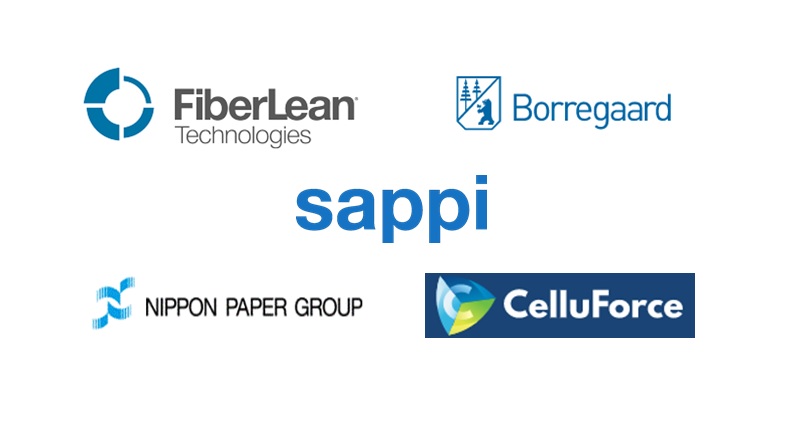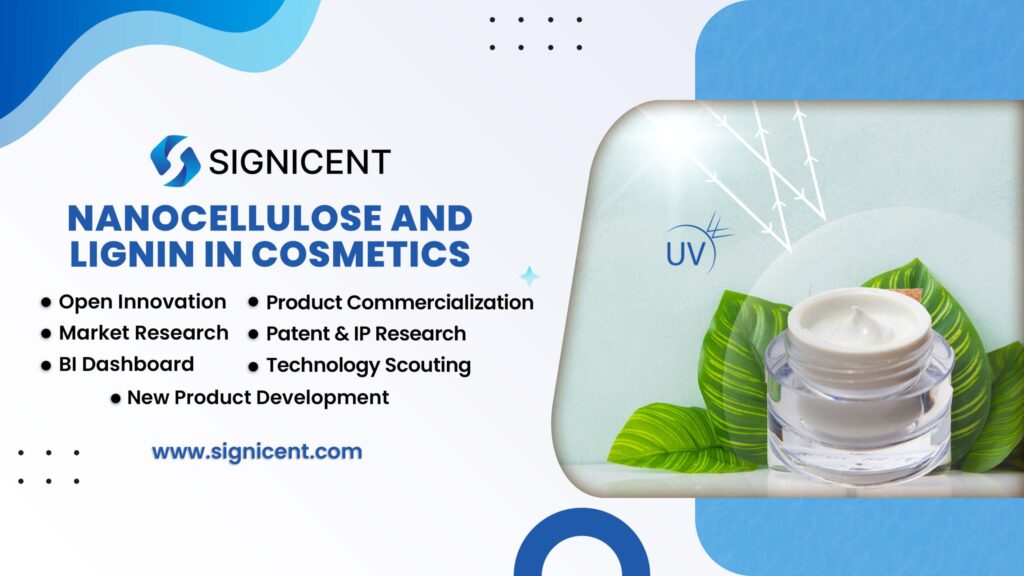The objective of the report is to look into the technological advancements in the field of Nanocellulose and Lignin. The report will encompass technical research, market research along with competitive analysis for the applications of nanocellulose and lignin. It will also explore innovative products and the future insights of Nanocellulose & Lignin in cosmetics and the beauty industry.
Challenges
To understand the industry challenges relating to the applications of nanocellulose & lignin in cosmetics, the experts at Signicent went through several scientific literatures/ academic publications and patent literature based upon which our team identified the following major challenges:
- Chemical-based commercial sunscreens contain a large amount of synthetic ultraviolet (UV) actives that are causing widespread damage to ocean life and affecting human health.
- An opaque cosmetic hides the skin’s transparency under a paint-like coating. It will cover the imperfections but the skin appears dull and aesthetically displeasing.
Solutions
Post comprehensive analysis we came across the following viable, innovative, and possibly the finest solutions:
Lignin based Sunscreen
An improved and safer version of bio-based sunscreen is designed using lignin-based UV absorbers. An ordinary kraft lignin is used as a sunscreen UV absorber in terms of sun protection factor (UVB−SPF) and UVA−UVB transmittance.
Lignins are best suited for dark-tinted SPF cosmetics with better mechanical properties. The performance of sunscreens will ultimately improve with the conversion of Lignins into nanoparticles. Moreover, the use of natural ingredients will not harm the skin.
The UVB−SPFs of sunscreens formulated with 10% regular kraft lignin as the UV actives reached values of up to 8.7, well below the value of 15 considered as adequate sunscreen for daily usage.
Nanocellulose-based Beauty Thickener
Nanocellulose fiber (CNF), has significant properties of moisture adsorbing and thickening effect, and it is a harmless plant-based resource. The recent addition of nanocrystalline cellulose to cosmetic formulations provides an immediate improvement in the appearance of the skin and gives a far more natural look.
Different kinds of thickeners are blended with cosmetics to achieve a viscosity that is acceptable for usage, enhance the user experience, and help to stabilize the emulsifying system. The production process can secure the physical attributes, stability, and non-irritation needed as a thickener, allowing it to be applied as a base layer for other cosmetic products to be used on the skin.
The following steps are involved in the production of thickener for cosmetics:
- Preparation of cellulose suspension
- Dissociation of cellulose pulp
- Pulverization of cellulose pulp
- Nano-ization of cellulose
Innovative Products
The Nanocellulose & Lignin in Cosmetics report shares information on innovative products. These products are completely made from natural fibers and plants.
Renewal + Hydration Face Mask
The Nano-hydration technology used in this face mask incorporates Nanocellulose fibers that are derived from plants and trees. These fibers absorb a significant amount of moisture and offer intense hydration directly to the skin.
Vatencel®
Vatencel® is used as a moisturizer, viscosity modifier, and phase stabilizer. It consists of ultra-thin nanocellulose. Nanocellulose has various features over conventional synthetic-based chemicals. Nanocellulose is an eco-friendly biological substance that has excellent price competitiveness compared to conventional chemical synthetic materials. Some of the major properties of nanocellulose are listed below:
- Strong mechanical strength
- Thermal stability
- Low density
- High water retention
Market Analysis
This section of the Nanocellulose & Lignin in Cosmetics report sheds some light on the different market trends across the globe.
The global Nanocellulose market size was valued at USD 291.53 million in 2019 and is projected to reach USD 1053.09 million by 2027. It is projected to grow at a CAGR of 19.9% during the forecasted period. Europe is estimated to have the largest share in the market due to the abundance availability of wood in the Eastern Europe region. Furthermore, the Asia-Pacific regions are growing at a fast pace as the use of nanocellulose is increasing in the regions.
Increasing utilization of cellulose nanocrystals in both paper and plastic-based packaging is the major growth driver of the nanocellulose market. However, as the market expands, there is a growing need for specialized equipment and machines for extraction processes.
Merger & Acquisition
Croda & Anomera’s collaboration
Croda is a British specialty chemicals company, generating 60% of its sales from outside of Europe. The business is divided into four sectors: consumer care, life sciences, performance technologies, and industrial chemicals. The company Anomera Inc. manufactures chemical compounds. The company manufactures natural cellulose from wood waste and pulp from the forestry industry for the cosmetic and skin care markets.
Croda has become an exclusive distributor of Anomera’s products in the Personal Care Market. In addition to worldwide distribution, the partners collaborated to develop unique and innovative multifunctional ingredients for beauty products that fulfilled the demands of consumers and the beauty industry. Croda launched the ChromaPurTM range to the Personal Care market. This advanced generation of natural cellulose powders is based on an environment-friendly process using Black Spruce Pulp that has been sustainably harvested from Canadian forests.
Stora Enso acquired Cellutech AB
Stora Enso (Finland) is a global market leader of renewable solutions in different fields like packaging, biomaterials, wooden construction, and paper. Cellutech is a Sweden-based company that develops cutting-edge wood-based products. It seeks to offer innovative products and solutions to meet the demands for a sustainable future./
Stora Enso has increased its ownership up to 100% in the Cellutech AB. The company aims to develop novel products and applications based on cellulose, micro-fibrillated cellulose (MFC), and other wood-based substances. The acquisition promotes the idea of adopting renewable wood-based materials than those made of fossil fuels.
Key Players
This section of the Nanocellulose & Lignin in Cosmetics Report highlights the key players actively working in the market.

Future Insights
- Microneedle Patches for skin: The fabrication of hyaluronic acid-based microneedle (MNs) patches that uses a bacterial nanocellulose membrane as the back layer of the MNs array. This membrane is loaded with the bioactive chemical, called rutin.
- Cellulose derived Aerogel: The KTH Royal Institute of Technology (Stockholm) has developed an aerogel by using just natural ingredients, including plant cellulose and algae with the aid of a kitchen freezer. The aerogel would be utilized therapeutically, to heal wounds or other medical problems.
- Polymer material: The Purdue team came up with a unique way for manufacturers to use nanocellulose. The process involves the mixing of nanocellulose with the additives for the polymer material, such as plasticizer, and then instead of directly mixing them, compound that mixture into the polymer.
Recent Report
- GCCs in Asia: Powering the Next Era of Global Digital and Biotech Innovation
- How Today’s Lipstick Formulations Deliver Comfort, Color & Clean Beauty
- How EU Regulations Shape Product Safety, Sustainability and Business Compliance
- Transparent Solar Panels Powering Smart and Green Cities
- Future of Cooking with Nanotechnology: How Smart Kitchen Technology Is Transforming Modern Kitchens


